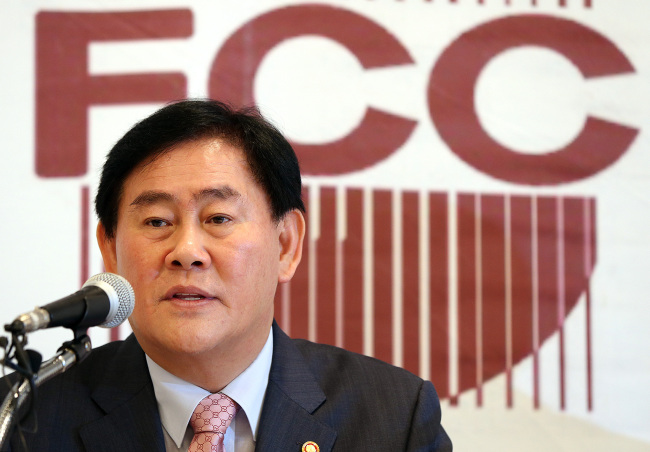Economic slowdown caused by complex structural problems
By Park Hyung-kiPublished : Sept. 16, 2014 - 21:22
South Korea’s current economic slowdown is not a “temporary” phenomenon affected by cyclical factors but by complicated structural problems, the finance minister said Tuesday, worrying that the economy might take the road of Japan’s lost decades “if we do not respond in a timely manner.”
Meeting with foreign journalists to explain Seoul’s economic policy measures that his team has taken since mid-July, Finance Minister Choi Kyung-hwan reaffirmed that the government will implement expansionary macroeconomic policies “until they produce tangible results” while tackling structural problems facing the Korean economy.
“The Korean economy grew rapidly in the past, but the economic recovery is slowing amid continuing years of low growth,” Choi said. “Some economic indicators have shown signs of improvement since business and consumer sentiment slumped following the Sewol ferry disaster. But the recovery is still weak.
Meeting with foreign journalists to explain Seoul’s economic policy measures that his team has taken since mid-July, Finance Minister Choi Kyung-hwan reaffirmed that the government will implement expansionary macroeconomic policies “until they produce tangible results” while tackling structural problems facing the Korean economy.
“The Korean economy grew rapidly in the past, but the economic recovery is slowing amid continuing years of low growth,” Choi said. “Some economic indicators have shown signs of improvement since business and consumer sentiment slumped following the Sewol ferry disaster. But the recovery is still weak.

“The new economic team understands that the current slowdown is not a temporary phenomenon affected by cyclical factors but rather stems from more complex and structural problems,” he added.
South Korea’s economy expanded 0.5 percent in the second quarter from three months earlier, slowing from 0.9 percent on-quarter growth logged in the previous quarter.
Asia’s fourth-largest economy expanded 3.5 percent on-year in the second quarter, but the growth was the slowest clip since the third quarter of last year.
Last week, South Korea’s central bank held the base rate at 2.25 percent in a widely expected move, a month after it cut the policy rate for the first time in 15 months under government pressure.
The central bank said that while the Korean economy is forecast to gradually improve, the delay in recovery of investment sentiment may work as a destabilizing factor.
The finance minister cited the stagnant pace of household income growth, weak business sentiment, a declining working population, and a situation in which the country has to struggle between intensifying competition with advanced countries and emerging countries quickly catching up.
Choi said that the situation that Korea faces now is similar in many aspects to what Japan faced during the so-called lost two decades, adding that it might follow in the footsteps of Japan unless it responds in a timely manner.
Explaining stimulus measures that he has unveiled over the past months, Choi reiterated that the government will work hard to prevent the country from following Japan’s path by tackling structural problems and carrying out diverse stimulus measures.
“The new economic team will revitalize the sluggish economy by implementing policies in an assertive manner while tackling the structural problems in order for the Korean people to feel confident of economic improvement,” the finance minister said, adding the country’s economy will be able to return to 4 percent growth next year.
“We will implement expansionary macroeconomic policies until they produce tangible results.”
South Korea’s economy expanded 3.0 percent in 2013 and is expected to grow 3.7 percent this year. (Yonhap)




![[Herald Interview] 'Amid aging population, Korea to invite more young professionals from overseas'](http://res.heraldm.com/phpwas/restmb_idxmake.php?idx=644&simg=/content/image/2024/04/24/20240424050844_0.jpg&u=20240424200058)











![[KH Explains] Korean shipbuilding stocks rally: Real growth or bubble?](http://res.heraldm.com/phpwas/restmb_idxmake.php?idx=652&simg=/content/image/2024/04/25/20240425050656_0.jpg&u=)

